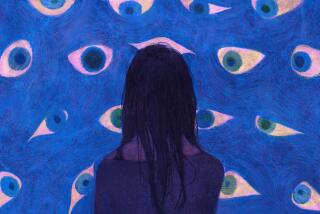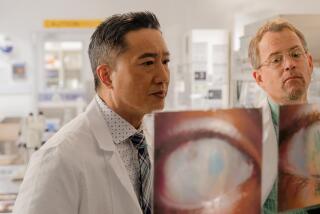A Moving View of Life Through Failing Eyes
- Share via
Henry Grunwald was the editor in chief of Time magazine during a period that many regard as its most sophisticated and insightful. He later served as United States ambassador to his native Austria, a country he’d fled as a Jewish refugee in the 1930s.
An inveterate reader and something of an art lover, Grunwald was looking forward to a retirement filled with his favorite activities. Then, seven years ago, he experienced the first signs of a condition that threatened to deprive him of his eyesight and that, indeed, has caused him to see the world around him “half-veiled.” Grunwald’s condition is known as macular degeneration. Although most common among older adults, it can afflict the young as well. There are some treatments, but thus far, no cure.
“I can still see . . . almost everything,” he explains, “but as if through a scrim.” Recognizing people is difficult: Not only did he once mistake Princess Diana for Diane Sawyer, but he also reports mistaking a statue of a monkey in a restaurant for the maitre d’.
“Shopping or window shopping is difficult,” he reports. “A shop window full of shoes can look like a candy store and a cleaner can look like a deli. I have walked into a ladies’ room thinking it was the men’s room. . . .” Reading has become next to impossible, and the countless shelves of books with which he has surrounded himself have receded into silence. Although he has availed himself of the various resources, tape-recorded books and other audio devices, he finds they cannot replace what he has lost.
The list of writers who lost most or all of their sight is a far-ranging one, from the epic poets Homer and Milton to Jorge Luis Borges, Aldous Huxley and humorist James Thurber, who was a cartoonist as well as a writer. Grunwald draws some inspiration from their examples of grace under pressure but cannot always take comfort in what they came to feel were positive aspects of their condition. Thurber found a kind of pleasure in the magic “kingdom of the partly blind,” where fanciful illusions mingle with reality in a kind of Wonderland of misperception. Borges found in blindness a sense of timelessness and freedom from pressure. A true journalist and a dyed-in-the-wool realist, Grunwald, on the contrary, does not enjoy the experience of vagueness: “Fantasies based on faulty vision do not delight me and I do not welcome the soft edges of reality; I miss the hard edges.”
Not only journalists, but many writers of all kinds--novelists, biographers, historians, even poets--rely upon the “hard edges,” the sharp and vivid accretion of significant detail, in conveying their perceptions and ideas. Seasoned journalist that he is, Grunwald gives us the “hard edges” with concision and clarity: the specifics of his own situation, the known facts about macular degeneration, its causes and treatments, and the kinds of practical and emotional assistance available from organizations like the Lighthouse. (I, for one, had no idea that the Lighthouse was founded in this century by the philanthropic daughters of publisher Henry Holt.)
Yet at the same time, Grunwald infuses his book with softer, more imaginative discussions on the metaphysical and symbolic aspects of vision and blindness as reflected in religion and mythology: the all-seeing God of the Israelites, the eye painted on the inside of coffins in ancient Egypt to enable the dead to see in the next world, the terrifying gaze of Athena, the blindness of King Oedipus and the prophet Tiresias.
Natural history also furnishes Grunwald with food for thought, as he contemplates the miracle and mystery of the evolutionary development of this complex organ from simple, light-seeking cells. Although Grunwald, despite his book’s subtitle, is too much of a realist to claim that his loss of eyesight has led to a corresponding increase of wisdom and understanding, it has undoubtedly resulted in an elegant, moving, and enlightening book.
More to Read
Sign up for our Book Club newsletter
Get the latest news, events and more from the Los Angeles Times Book Club, and help us get L.A. reading and talking.
You may occasionally receive promotional content from the Los Angeles Times.










